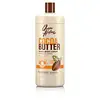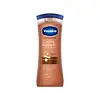What's inside
What's inside
 Benefits
Benefits

 Concerns
Concerns

 Ingredients Side-by-side
Ingredients Side-by-side

Water
Skin ConditioningParaffinum Liquidum
EmollientStearic Acid
CleansingGlyceryl Stearate
EmollientSodium Lauryl Sulfate
CleansingPropylene Glycol
HumectantTheobroma Cacao Seed Butter
EmollientStearyl Alcohol
EmollientParfum
MaskingLanolin
EmollientMethylparaben
PreservativeDisodium EDTA
Diazolidinyl Urea
PreservativeAcid Yellow 3 Aluminum Lake
Acid Red 14 Aluminum Lake
CI 17200
Cosmetic ColorantWater
Skin ConditioningGlycerin
HumectantPetrolatum
EmollientStearic Acid
CleansingDimethicone
EmollientButylene Glycol
HumectantGlycol Stearate
EmollientPEG-100 Stearate
Isopropyl Myristate
EmollientHelianthus Annuus Seed Oil
EmollientCocos Nucifera Oil
MaskingGlyceryl Stearate
EmollientTheobroma Cacao Seed Butter
EmollientPhenoxyethanol
PreservativeCetyl Alcohol
EmollientMagnesium Aluminum Silicate
AbsorbentParfum
MaskingMethylparaben
PreservativeHydroxyethylcellulose
Emulsion StabilisingXanthan Gum
EmulsifyingPropylparaben
PreservativeDisodium EDTA
Stearamide Amp
Coumarin
PerfumingGeraniol
PerfumingHexyl Cinnamal
PerfumingHydroxycitronellal
PerfumingLimonene
PerfumingLinalool
PerfumingCaramel
Cosmetic ColorantWater, Glycerin, Petrolatum, Stearic Acid, Dimethicone, Butylene Glycol, Glycol Stearate, PEG-100 Stearate, Isopropyl Myristate, Helianthus Annuus Seed Oil, Cocos Nucifera Oil, Glyceryl Stearate, Theobroma Cacao Seed Butter, Phenoxyethanol, Cetyl Alcohol, Magnesium Aluminum Silicate, Parfum, Methylparaben, Hydroxyethylcellulose, Xanthan Gum, Propylparaben, Disodium EDTA, Stearamide Amp, Coumarin, Geraniol, Hexyl Cinnamal, Hydroxycitronellal, Limonene, Linalool, Caramel
 Reviews
Reviews

Ingredients Explained
These ingredients are found in both products.
Ingredients higher up in an ingredient list are typically present in a larger amount.
Disodium EDTA plays a role in making products more stable by aiding other preservatives.
It is a chelating agent, meaning it neutralizes metal ions that may be found in a product.
Disodium EDTA is a salt of edetic acid and is found to be safe in cosmetic ingredients.
Learn more about Disodium EDTAGlyceryl Stearate is a mix of glycerin and stearic acid.
It is used to stabilize the mixing of water and oil ingredients. By preventing these ingredients from separating, it can help elongate shelf life. It can also help thicken the product's texture.
As an emollient, it helps soften skin and supports barrier-replenishing ingredients.
In cosmetics, Glyceryl Stearate is often made from vegetable oils or synthetically produced.
This ingredient may not be fungal-acne safe
Fun fact: The human body also creates Glyceryl Stearate naturally.
Learn more about Glyceryl StearateMethylparaben is a preservative and is a paraben. It is used to prevent the growth of fungus, mold, and other harmful bacteria. Parabens are chemicals used as preservatives in both cosmetics and food.
Methylparaben can be synthetically created. It can also be found naturally in some fruits, such as blueberries.
Oftentimes, Methylparaben is combined with other parabens to help increase the shelf life.
The safety of Methylparaben is currently being studied. While ongoing studies are looking into the safety of parabens, the results have been very mixed. Some studies have not found Methylparaben to be harmful.
Learn more about MethylparabenParfum is a catch-all term for an ingredient or more that is used to give a scent to products.
Also called "fragrance", this ingredient can be a blend of hundreds of chemicals or plant oils. This means every product with "fragrance" or "parfum" in the ingredients list is a different mixture.
For instance, Habanolide is a proprietary trade name for a specific aroma chemical. When used as a fragrance ingredient in cosmetics, most aroma chemicals fall under the broad labeling category of “FRAGRANCE” or “PARFUM” according to EU and US regulations.
The term 'parfum' or 'fragrance' is not regulated in many countries. In many cases, it is up to the brand to define this term.
For instance, many brands choose to label themselves as "fragrance-free" because they are not using synthetic fragrances. However, their products may still contain ingredients such as essential oils that are considered a fragrance by INCI standards.
One example is Calendula flower extract. Calendula is an essential oil that still imparts a scent or 'fragrance'.
Depending on the blend, the ingredients in the mixture can cause allergies and sensitivities on the skin. Some ingredients that are known EU allergens include linalool and citronellol.
Parfum can also be used to mask or cover an unpleasant scent.
The bottom line is: not all fragrances/parfum/ingredients are created equally. If you are worried about fragrances, we recommend taking a closer look at an ingredient. And of course, we always recommend speaking with a professional.
Learn more about ParfumStearic Acid is a fatty acid. It is an emollient, emulsifier, and texture enhancer.
As an emollient, stearic acid helps soften skin. It aids the skin's protective barrier by preventing water loss. It also provides a gentle cleansing effect without stripping away natural oils.
Stearic acid may also be used to enhance the texture of products. It can add volume and stabilize ingredients such as water and oil. This can help water and oil ingredients from separating.
Sources of stearic acid include animal or vegetable fats/oils such as coconut or shea. It can be naturally found in butter, cocoa butter, shea butter, vegetable fats, and animal tallow.
This ingredient may not be Malassezia folliculitis, or fungal-acne safe.
Learn more about Stearic AcidTheobroma Cacao Seed Butter comes from the Theobroma cacoa, or Cacao tree. Cacao trees are native to tropical landscapes.
Like other plant butters, Cacao seed butter is an emollient. Emollients help soothe and soften your skin. By creating a barrier to trap moisture in, emollients help keep your skin hydrated.
Cacao seed butter contains antioxidants known as polyphenols. Antioxidants help fight free-radical molecules by stabilizing them. Unstable free-radicals may cause damage to your skin cells. Antioxidants may help with anti-aging.
Theobroma Cacao Seed Butter can be bad for acne prone skin.
Learn more about Theobroma Cacao Seed ButterWater. It's the most common cosmetic ingredient of all. You'll usually see it at the top of ingredient lists, meaning that it makes up the largest part of the product.
So why is it so popular? Water most often acts as a solvent - this means that it helps dissolve other ingredients into the formulation.
You'll also recognize water as that liquid we all need to stay alive. If you see this, drink a glass of water. Stay hydrated!
Learn more about Water